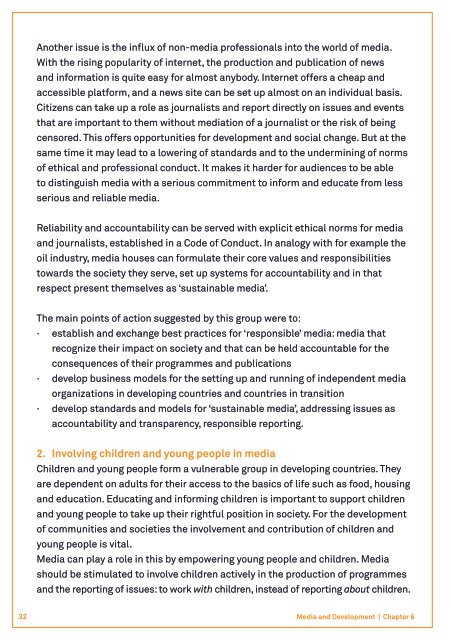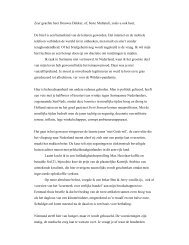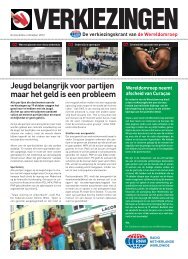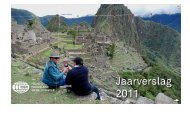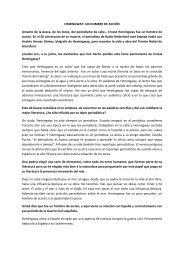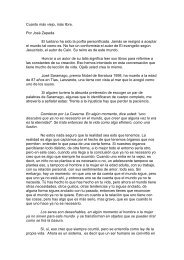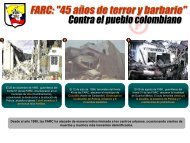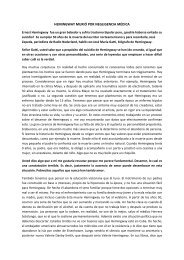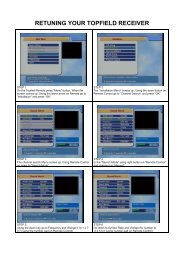Media and Development - RNW - Radio Netherlands Worldwide
Media and Development - RNW - Radio Netherlands Worldwide
Media and Development - RNW - Radio Netherlands Worldwide
You also want an ePaper? Increase the reach of your titles
YUMPU automatically turns print PDFs into web optimized ePapers that Google loves.
Another issue is the influx of non-media professionals into the world of media.<br />
With the rising popularity of internet, the production <strong>and</strong> publication of news<br />
<strong>and</strong> information is quite easy for almost anybody. Internet offers a cheap <strong>and</strong><br />
accessible platform, <strong>and</strong> a news site can be set up almost on an individual basis.<br />
Citizens can take up a role as journalists <strong>and</strong> report directly on issues <strong>and</strong> events<br />
that are important to them without mediation of a journalist or the risk of being<br />
censored. This offers opportunities for development <strong>and</strong> social change. But at the<br />
same time it may lead to a lowering of st<strong>and</strong>ards <strong>and</strong> to the undermining of norms<br />
of ethical <strong>and</strong> professional conduct. It makes it harder for audiences to be able<br />
to distinguish media with a serious commitment to inform <strong>and</strong> educate from less<br />
serious <strong>and</strong> reliable media.<br />
Reliability <strong>and</strong> accountability can be served with explicit ethical norms for media<br />
<strong>and</strong> journalists, established in a Code of Conduct. In analogy with for example the<br />
oil industry, media houses can formulate their core values <strong>and</strong> responsibilities<br />
towards the society they serve, set up systems for accountability <strong>and</strong> in that<br />
respect present themselves as ‘sustainable media’.<br />
The main points of action suggested by this group were to:<br />
· establish <strong>and</strong> exchange best practices for ‘responsible’ media: media that<br />
recognize their impact on society <strong>and</strong> that can be held accountable for the<br />
consequences of their programmes <strong>and</strong> publications<br />
· develop business models for the setting up <strong>and</strong> running of independent media<br />
organizations in developing countries <strong>and</strong> countries in transition<br />
· develop st<strong>and</strong>ards <strong>and</strong> models for ‘sustainable media’, addressing issues as<br />
accountability <strong>and</strong> transparency, responsible reporting.<br />
2. Involving children <strong>and</strong> young people in media<br />
Children <strong>and</strong> young people form a vulnerable group in developing countries. They<br />
are dependent on adults for their access to the basics of life such as food, housing<br />
<strong>and</strong> education. Educating <strong>and</strong> informing children is important to support children<br />
<strong>and</strong> young people to take up their rightful position in society. For the development<br />
of communities <strong>and</strong> societies the involvement <strong>and</strong> contribution of children <strong>and</strong><br />
young people is vital.<br />
<strong>Media</strong> can play a role in this by empowering young people <strong>and</strong> children. <strong>Media</strong><br />
should be stimulated to involve children actively in the production of programmes<br />
<strong>and</strong> the reporting of issues: to work with children, instead of reporting about children.<br />
32 <strong>Media</strong> <strong>and</strong> <strong>Development</strong> | Chapter 6<br />
Exploring options <strong>and</strong> opportunities 33


